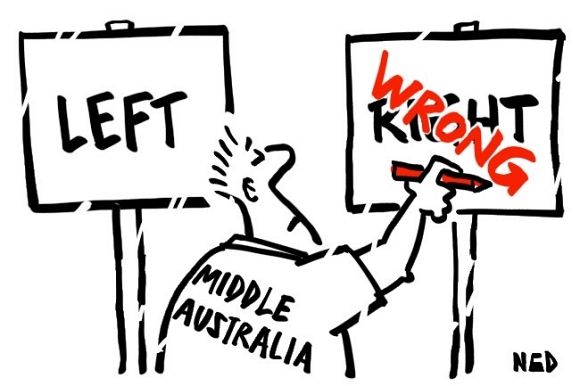We do not want a complicated voting system, but we do want a system closer to "one vote, one value", writes Kim Sawyer.
WE HAVE ELECTED the members of parliament to represent us, but who or what do they represent?
Most Australians see their representative only once every three years, usually on a placard at the train station before the election. Rarely do voters contact politicians, and even then, only if there is a problem. Every six months, a photo of one appears in the letterbox — more often when they want their job renewed.
When you do want to see a politician, typically you speak to one of their advisers and not to them. Whether you get a response depends on the problem. Whistleblowers and scam victims know how unresponsive their representatives are, except to paid lobbyists with unlimited access to them.
Politicians represent us, but not how we think. Politicians are like us; they are self-interested like us, but more so. They leverage our interest with their self-interest. They are supposed to speak for their electorate inside parliament and to their electorate outside parliament. But when the electorate is so divided, do they?
Let us consider the electorate of Melbourne held by Greens leader Adam Bandt.
With 67% of the vote counted at the time of publishing*, Labor may win the seat, a swing to Labor of 9% on two-party preferred vote. Labor received nearly 7,000 votes less than Bandt. If they win, they will win because of 14,000 Liberal votes.
The Liberals gave their preferences to Labor ahead of the Greens. Labor’s principal constituency is Labor voters; their second constituency is the Liberal voters. The Labor candidate for Melbourne depended on Liberal voters as much as their own voters.
A member of parliament represents all of the electorate, but how can a Labor candidate represent the 14,000 Liberal voters who got them over the line and the plurality who voted for Bandt?
The problem with preferential voting is that a Labor representative of the people, who gets only 31% of the primary vote, depends too heavily on the Liberal voters who got them elected.
Electorates depend on artificial lines on a map. The Electoral Act provides for redistributions based on population changes.
Adam Bandt knows this better than anyone. The boundaries of the Melbourne electorate were changed to include South Yarra and Prahran, where the Greens' vote is weaker and to exclude Brunswick and Fitzroy North, where the Greens' vote is stronger. The redistribution meant that Bandt was up against more than politics.
The preferential voting system favours the major parties. The most important factor in Australian elections is who the voter likes least.
The Liberals had an unelectable leader, ran a campaign that made them even more unelectable and then there was the Trump factor. The antipathy of the Trump factor was so strong that it worked against independents and the Greens. Albo’s trump card was Temu Trump.
Each major party typically gets at least 30% of the primary vote, the winner usually getting over the line from the preferences of minor parties. The winner often fails to acknowledge the third parties that got them elected or got them elected previously. They are not very gracious.
After the election, Foreign Minister Penny Wong commented:
“Unfortunately, Adam Bandt, you know, in some ways is quite like [Opposition Leader] Peter Dutton. It’s the same conflict. It’s the same … frankly, sometimes quite aggressive and the same politics of protest and grievance. Australians have comprehensively rejected that."
Neither major party wants the Greens to be influential.
The major parties are more alike than we think. Only an independent candidate who establishes a strong identity can hope to defy the duopoly. Andrew Wilkie is one example.
When you are an unpaid lobbyist, you understand how difficult it is to influence politicians. The independents listen, the Greens listen, but the main parties will only listen if the issue is central and not marginal to them.
Scam victims have come to understand this over the last two years. Scam victims have been supported by independents and Greens, but not by the major parties, whose representatives defer to their party spokespersons.
Representatives of the major parties represent the party, not the people, since the greatest risk for the major parties is disunity within.
Scam victims were forced to seek representatives outside their electorate to advocate for them. They came to understand that the Government only listens to the Australian Banking Association (ABA).
The election has brought into focus whether the electoral system is representative of the people.
With nearly 80% of the votes counted at the time of publishing*, Labor has gained 34.8% of the primary vote, the Coalition 32.2%, Others 13.2%, Greens 11.8%, One Nation 6.2%, Trumpet of Patriots 1.8%.
Labor has won 89 seats, the Coalition has won 39, Others have won 10 and 14 seats remain undecided.
The Greens and Trumpet of Patriots did not win a seat. PHON is yet to be confirmed as winning a seat.
With less than 35% of the primary vote, Labor has won nearly two-thirds of the seats decided. Was this outcome representative of the people or representative of a system that gives too much weight to second preferences? Two-thirds of the voters did not preference the Government. That is hardly an overwhelming performance appraisal.
What is to be done to make the outcome more representative, more akin to "one vote, one value"?
The electoral system matters. The first past the post system used in the UK and the U.S. biases results towards voters’ first preferences, as the election of U.S. President Donald Trump in 2016 showed. Trump won 304 electoral college votes to presidential candidate Hillary Clinton’s 227, yet lost the popular vote by three million votes.
Our system, however, is also biased towards second and later preferences. The Labor candidate in Melbourne depended as much on Liberal voters as Labor voters.
If seats were allocated proportionately to the aggregate primary votes cast – that is, if the Greens, which got 12% of the primary votes also got 12% of the seats – then the outcome would be different. Of the 137 seats decided, Labor would have 48 seats, the Coalition would have 44, Others would have 18, Greens would have 16, PHON would have eight and Trumpet of Patriots would have three. This would be the outcome representative of the first preferences and not the second preferences.
Perforce, this allocation would impart too much instability. The major parties would never accept it. Instead, they consign voters’ first preferences to the Senate, which becomes the house of review.
Nonetheless, the Senate does not initiate appropriation bills. It does not initiate most legislation. The findings of Senate Inquiries often lie dormant for years. The Senate fine-tunes legislation, but it is the House of Representatives that matters.
We need to find a better balance between voters’ first and second preferences.
One possibility would be optional preferential voting, which wouldn't require voters to preference a candidate they didn't want.
Another possibility would be the Hare-Clark electoral system used in elections in Tasmania and the ACT. It is a proportional voting system that allows second preferences to be counted but with reduced value, implying that the 14,000 second preference Liberal votes in the Melbourne electorate would have less value than the 23,000 first preference Labor votes.
We do not want a complicated system, but we do want a system closer to "one vote, one value". The arbitrary lines on a map would not matter as much as the real preferences of people. The first preferences of voters would carry more weight than their second preferences.
The landslide victory was not really a landslide. The landslide depended on the voting system.
*All figures quoted in this article are accurate as at the time of publication (AEC).
Dr Kim Sawyer is a senior fellow in the School of Historical and Philosophical Studies at the University of Melbourne.
 This work is licensed under a Creative Commons Attribution-NonCommercial-NoDerivs 3.0 Australia License
This work is licensed under a Creative Commons Attribution-NonCommercial-NoDerivs 3.0 Australia License
Support independent journalism Subscribe to IA.














